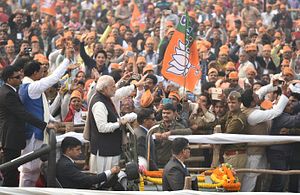The recently concluded election in Gujarat took the Bharatiya Janata Party (BJP), the ruling party in the Indian state, by surprise. The party had expected to romp home with 150 seats, but managed to win only 99, a drop of nearly 14 percent from the 115 seats it had secured in the 2012 elections. The ruling party barely managed to get the required numbers to form the state government for the sixth time in a row.
There are several reasons for this modest performance. First, there are the economic factors. People in Gujarat were not happy with last year’s surprise demonetization of the Indian currency, which severely impacted small traders and businessmen. The government at the center, also led by the BJP, suffered their displeasure. In addition, the central government did not think through the possible impacts of introducing of the Goods and Services Tax (GST), popularly known as “One Nation, One Tax.” Though a well-conceived reform aimed at eliminating multiple tax structures, unfortunately, the high slab of taxes on certain products had an adverse effect not only on small traders and companies but also big businesses as well. The government must be credited for realizing the various lacunae in the tax structure, and reducing the tax on certain products, but by then the GST had already caused a temporary disruption in business.
At the same time, India is facing an agrarian crisis, with many farmers committing suicide due to being caught in debt traps. The anger of farmers led to their voting against the incumbent BJP this time around in Gujarat.
Unemployment also played a role in the BJP’s close call. Prime Minister Narendra Modi of the BJP, who had promised to push though big-ticket reforms and create 20 million jobs, fell short of his promises. Only 200,000 jobs were created during the last fiscal year, leading to an unemployment rate of over 5 percent. This led to palpable anger among the youth of Gujarat.
Politically, after the elevation of Modi to be India’s prime minister, it created a leadership vacuum in Gujarat. Modi, who was the chief minister of the state for over 12 years, and credited for its transformation, was succeeded by weak leaders who had neither the vision nor the leadership to take Gujarat forward. The people were unhappy with a dysfunctional government.
The results of Gujarat’s elections are symptomatic of the present state of the Indian economy, which invited the ire of both farmers and youths. As the agrarian crisis and lack of job opportunities find resonance in all Indian states, it is unclear what the future will hold for the party in the next year’s state elections in BJP-ruled Rajasthan and Madhya Pradesh.
The Indian economy, which was among the fastest growing economies of the world last year, even surpassing China, was severely impacted by demonetization and the GST. GDP growth fell from a robust 7.5 percent in 2016 to below 6.7 percent this year (according to the IMF’s projection). Not only people from the opposition but also prominent leaders from Modi’s own party have raised their concerns over his economic policies.
However, the BJP managed to scrape through in the Gujarat elections — and also won a resounding victory in Himachal Pradesh, because of Modi’s active campaigning — as people still continue to put their faith in the prime minister’s leadership, mainly due to a lack of credible alternatives. However, if Modi does not push through big-ticket reforms that can generate jobs for youths and take policy decisions to address the agrarian crisis, it may have an adverse impact on the party’s ability to win election after election.
Further, the opposition Congress Party, which was practically written off, has got a new lease on life following the BJP’s modest performance in Gujarat. They have realized that BJP is no longer invincible, and the Congress has the ability to defeat it.
In fact, the Gujarat results has opened a small window for India’s opposition parties, as can be seen by the spectacular performance of the Congress, which managed to increase its tally from 51 seats in the 2012 elections to 79, a 50 percent increase. If Congress leader Rahul Gandhi can maintain this momentum like in Gujarat, he can pose a threat to Modi in the next general elections.
Indian voters have matured over the last several years, and are able to see through the gimmicks of various political parties. Modi can no longer bank on the rhetoric, jingoism, and unrealistic promises made during the run-up to the 2014 general elections. Indian voters are now demanding accountability from him. If the BJP fails to act this time around, they may find it difficult to win the next general elections. One can safely say that Modi’s charisma translated into votes in Gujarat, as the voters wanted to give him one more opportunity to fulfill his promises. But they may not be so charitable the next time around.
Modi must have also gauged the people’s mood during his election rallies. This time, he could not enthuse the voters merely through his charisma and oratorical skills. People are now demanding results. For the first time, Modi’s campaign was more controversial and divisive than successful.
Meanwhile, Rahul Gandhi, who was practically written off, made waves at all his election rallies with promises to address the concerns of farmers, the poor and youths. There is also a growing realization among voters that a strong and credible opposition will make the present government more accountable, both at the center and in the states.
If Modi fails to gauge the national mood, and fails to act on his electoral promises, there is no guarantee that he will get the same mandate he got in the 2014 general elections.
K.S. Venkatachalam is an independent journalist.

































